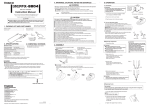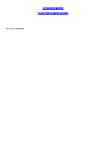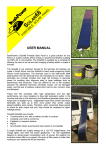Download Parallel Plate Ionization Chambers
Transcript
Parallel Plate Ionization Chambers R User Manual WWW. .COM Parallel Plate Ionization Chambers STANDARD IMAGING INC. 7601 Murphy Drive Middleton, WI 53562-2532 Feb / 2005 ©2005 Standard Imaging Inc. DOC #80332-06 TEL 800.261.4446 TEL 608.831.0025 FAX 608.831.2202 General Precautions Warnings and Cautions alert users to dangerous conditions that can occur if instructions in the manual are not obeyed. Warnings are conditions that can cause injury to the operator, while Cautions can cause damage to the equipment. ! WARNING: Electrical shock hazard when connected to 300V bias supply. ! WARNING: Exradin Ion Chambers are intended for quality assurance and calibration measurements. They are not intended to be connected to a patient for real-time dosimetry measurements. ! CAUTION: Proper use of this device depends on careful reading of all instructions and labels. ! CAUTION: Do not drop, mishandle, or disassemble unit since it may result in change of calibration factor, or damage. Refer all servicing to qualified individuals. ! CAUTION: Do not sharply bend triaxial cable. Damage to the cable may result in high leakage currents. This manual applies to the following parallel plate chamber models: Model REF A10 A11 P11 T11 A11TW P11TW T11TW 92702 92701 92703 92704 92708 92709 92710 4 Table of Contents PAGE 4 5 7 8 8 9 9 10 11 12 13 14 General Precautions General Operation Calibration Parts and Accessories General Chamber Specifications Model A10 Planar Electron Chamber Model 11 Spokas Chamber Model 11TW Thin-Window Chamber Service Notes Service Policy Customer Responsibility Warranty 7601 MURPHY DRIVE MIDDLETON, WI 53562-2532 USA WWW.STANDARDIMAGING.COM General Operation All Exradin parallel plate chambers are attached to a 1.5 m length of low-noise flexible triaxial cable that is terminated by a triaxial or coaxial connector. The collector of the chamber is common with the center wire of the cable and the center contact of the connector. The guard is common with the inner cable braid and the middle connector contact, in the case of triaxial connectors, and the connector body, in the case of coaxial connectors. The window (outer electrode), usually ground, is common with the outer braid of the cable and the connector body, in the case of triaxial connectors, and the pigtail extending out the rear of coaxial connectors. The design of Exradin chambers requires that the collector and guard operate at essentially the same potential. The polarizing potential, supplied by an electrometer, is applied between the window and the guard as shown in Figure 1. Either polarity may be applied to the window and either the window or guard may be grounded. Safety and other considerations recommend grounding the window, which then requires an electrometer with a floating input. All Exradin chambers can support 1000 V between window and guard. However, depending on the particular circumstance and radiation intensity, as little as 90 V may yield essentially 100% charge collection. 5 General Operation Continued LOW-NOISE WINDOW COLLECTOR GUARD ELECTROMETER Figure 1: Parallel Plate Chamber and Electrometer Because Exradin ionization chambers do not exhibit voltage soakage phenomena, readings of ionization current may be made immediately after application of the polarizing potential. However, it is good practice to pause a minute or two after changing the potential to allow switching transients induced in the electrometer to completely subside. Such transients are most evident in the rate (current) mode. Operating Instructions 1. With nothing connected to the input jack of the electrometer, turn the power on and wait at least 15 minutes for warm up. 2. Verify the leakage of the electrometer is within the manufacturer’s stated acceptable limits. 3. Connect the ionization chamber to the electrometer and apply 100% voltage bias. 4. Allow the electrometer and ionization chamber system at least 10 minutes to stabilize, making certain that all cabling is lying flat and unkinked. 5. Verify the leakage of the ionization chamber is within the manufacturer’s stated acceptable limits. If measured in the presence of background sources, note that this signal will add to the leakage of the chamber. 6. Some electrometers, such as the Standard Imaging MAX-4000 Electrometer, allow the user to zero the device at any time. If desired, perform this system zeroing now. 7. Check the system leakage. Take a reading without exposing the chamber to radiation. This reading should be less than 0.1% of the final signal expected. If it is not, the leakage should be subtracted from the signal. 8. Measure atmospheric temperature and pressure. For well chambers, measure the temperature in the well of the chamber. 6 General Operation Continued 9. Insert the ion chamber and take at least 3 measurements. Generally, the measurements should not be moving in only one direction (i.e. three readings that continue to drop and hence may not yet be stabilized). If a current measurement is done, allow sufficient time for value to stabilize. 10. Analyze the data taking into account the average of the readings, system leakage, temperature/pressure corrections, calibration factors and any other appropriate corrections to be made. Keep in mind that the calibration factor consists of the electrometer calibration and the ionization chamber calibration factor. 11. When all measurements are completed, set bias voltage to 0 VDC, turn off the electrometer and disconnect the ionization chamber. Calibration As is standard practice for other ionization chambers, it is recommended that Exradin chambers be calibrated every (2) years. This calibration should be performed by an Accredited Dosimetry Calibration Laboratory (ADCL). Standard Imaging offers calibrations from the University of Wisconsin ADCL. You need only one purchase order to cover calibrations, shipping and handling, and service. Standard Imaging hand carries all instruments to and from the University of Wisconsin ADCL. 7 Parts and Accessories REF Description 72136 72137 72130 72131 72132 72133 A10 Waterproof cap; 1.0 mm; acrylic Model 11 Waterproof cap; 1.0 mm; acrylic A11 Co-60 Calibration Cap; 1.8 mm P11 Co-60 Calibration Cap; 3.2 mm T11 Co-60 Calibration Cap; 3.4 mm A11TW Co-60 Calibration/ Waterproof Cap; 2.8 mm P11TW Co-60 Calibration/ Waterproof Cap; 4.2 mm T11TW Co-60 Calibration/ Waterproof Cap; 4.4 mm 72134 72135 General Chamber Specifications Nominal Collection Efficiency: Maximum Polarizing Potential: Nominal Inherent Leakage Currents: Low-Noise Triaxial Cable: Signal Connector: 100% 1000 V Humidity: Temperature: Pressure: 10-15 A 50 ohms, 29 pF/ft, 1.5 m long Triaxial BNC Plug (2-Lug Male); unless requested as other Integral with triaxial connector (shell of chamber is common with connector body) 10-80%, non-condensing -15 - 50 OC 680 - 770 mm Hg Product Standards: IEC 60601-11, IEC 607311 High Voltage Connector: 1 Designed to Meet 8 Model A10 Planar Electron Chamber A10 (REF 92702) Collecting Volume: Nominal Calibration Factor: Centroid of Collecting Volume: Collector Diameter: Window-Collector Gap: Window: 0.051 cm3 60 R/nC 1.0 mm from top of window 5.4 mm 2.0 mm Kapton film, 3.86 mg/cm2 Window Support Rings, Collec- A10 - Shonka Air-Equiv. tor, and Guard Material: plastic C552 Included Waterproofing Cap: Polarity: Model 11 Wall thickness of 1.0 mm; constructed of acrylic; TG-51 compliant < 1% Spokas Chamber A11 (REF 92701) P11 (REF 92703) T11 (REF 92704) Collecting Volume: Nominal Calibration Factor: Centroid of Collecting Volume: Collector Diameter: Window-Collector Gap: Window: 0.62 cm3 5.5 R/nC 2.0 mm from top of window 20.0 mm 2.0 mm 1.0 mm Window Support Rings, Collec- A11 - Shonka Air-Equiv. tor, and Guard Material: plastic C552 P11 - Polystyrene-Equiv. plastic D400 T11 - Shonka Tissue-Equiv. plastic A150 9 Model 11TW Thin-Window Chamber A11TW (REF 92708) P11TW (REF 92709) T11TW (REF 92710) Collecting Volume: Nominal Calibration Factor: Centroid of Collecting Volume: Collector Diameter: Window-Collector Gap: Window: 0.92 cm3 3.4 R/nC 1.5 mm from top of window 20.0 mm 3.0 mm Kapton film, 3.86 mg/cm2 Window Support Rings, Collec- A11TW - Shonka Air-Equiv. tor, and Guard Material: plastic C552 P11TW - Polystyrene-Equiv. plastic D400 T11TW - Shonka TissueEquiv. plastic A150 Included Waterproofing Cap: Wall thickness of 1.0 mm; constructed of acrylic; TG-51 compliant 10 Service Notes Stem The one-piece polycarbonate stem (0.9 cm OD, 7.6 cm long) found on these chambers is an integral part of the chamber assembly and is not to be removed under any circumstances. Venting These particular ionization chambers are equipped with a Tygon® tube secured to the chamber stem and running the full length of the triaxial cable. (The triaxial cable is inside the tubing.) The tubing is sealed to the chamber stem, and is open to ambient conditions at the connector end. This tubing is not intended to be removed or altered by the customer, and doing so will void the warranty. Calibration Cap Calibration caps constructed of the same material as the major elements of the chamber are available to provide more than adequate build-up for Cobalt-60 radiation. To secure cap on chamber: Simply place cap over chamber window. In the event of a Model 11TW Calibration/Waterproof Cap, follow instructions found under Waterproofing Cap for Model 11TW. Waterproofing Cap (A10 AND 11TW ONLY) The waterproofing cap provided with the chamber is made of acrylic and has a 1.0 mm thick window as recommended by the AAPM TG-51 protocol. The O-Ring inside the cap is designed to offer a snug fit to the chamber’s outer diameter, to ensure its seal. To secure cap on chamber: press cap firmly down onto chamber until it bottoms on chamber window ring. Occasionally, the O-Ring inside the cap will become twisted and prevent complete bottoming. If this occurs, simply rotate the cap (either clockwise or counterclockwise) while continuing downward pressure, until it bottoms on chamber window ring. To remove cap from chamber: Gently rotate (either clockwise or counterclockwise) cap while pulling slightly upward. Kapton® Window (A10 AND 11TW) The window is made of thin conducting Kapton® film and is under tension. Touching anything to the window is to be avoided. Tygon is a trademark of Saint-Gobain Performance Plastics Kapton is a trademark of E.I. du Pont Nemours and Company 11 Service Notes Continued ! Service and Maintenance There are no user-serviceable parts within these ionization chambers. Under no circumstance should the user attempt to repair or disassemble the chamber and/or connector, as the warranty will become void and the calibration factor will change. Under normal use, the chambers should provide years of troublefree service. If assistance is desired in the proper disposal of this product (including accessories and components), after its useful life, please return to Standard Imaging. Service Policy If service, including recalibration, is required, please contact Standard Imaging’s Customer Service department by phone or email prior to shipping the product. Standard Imaging’s Customer Service and Technical Service staff will attempt to address the product issue via phone or email. If unable to address the issue, a return material authorization (RMA) number will be issued. With the RMA number, the product can be returned to Standard Imaging. It is the responsibility of the customer to properly package, insure and ship the product, with the RMA number clearly identified on the outside of the package. The customer must immediately file a claim with their carrier for any shipping damage or lost shipments. Return shipping and insurance is to be pre-paid or billed to the customer, and the customer may request a specific shipper. Items found to be out of warranty are subject to a minimum service fee of 1 hour labor (excluding recalibrations) for diagnostic efforts and require a purchase order (PO) before service is performed. With concurrence from customer, the product may be replaced if it is unserviceable or if the required service is cost prohibitive. Products incurring service charges may be held for payment. Standard Imaging does not provide loaner products. See the Standard Imaging Warranty and Customer Responsibility for additional information. 12 Customer Responsibility This product and its components will perform properly and reliably only when operated and maintained in accordance with the instructions contained in this manual and accompanying labels. A defective device should not be used. Parts which may be broken or missing or are clearly worn, distorted or contaminated should be replaced immediately with genuine replacement parts manufactured by or made available from Standard Imaging Inc. ! CAUTION: Federal law in the U.S.A. and Canadian law restrict the sale, distribution, or use of this product to, by, or on the order of a licensed medical practitioner. The use of this product should be restricted to the supervision of a qualified medical physicist. Measurement of high activity radioactive sources is potentially hazardous and should be performed by qualified personnel. Should repair or replacement of this product become necessary after the warranty period, the customer should seek advice from Standard Imaging Inc. prior to such repair or replacement. If this product is in need of repair, it should not be used until all repairs have been made and the product is functioning properly and ready for use. After repair, the product may need to be calibrated. The owner of this product has sole responsibility for any malfunction resulting from abuse, improper use or maintenance, or repair by anyone other than Standard Imaging Inc. The information in this manual is subject to change without notice. No part of this manual may be copied or reproduced in any form or by any means without prior written consent of Standard Imaging Inc. 13 Warranty Standard Imaging, Inc. sells this product under the warranty herein set forth. The warranty is extended only to the buyer purchasing the product directly from Standard Imaging, Inc. or as a new product from an authorized dealer or distributor of Standard Imaging, Inc. For a period provided in the table below from the date of original delivery to the purchaser or a distributor, this Standard Imaging, Inc. product, provided in the table is warranted against functional defects in design, materials and workmanship, provided it is properly operated under conditions of normal use, and that repairs and replacements are made in accordance herewith. The foregoing warranty shall not apply if the product has been altered, disassembled or repaired other than by Standard Imaging, Inc. or if the product has been subject to abuse, misuse, negligence or accident. Product Standard Imaging Ionization Chambers Standard Imaging Well Chambers Standard Imaging Electrometers Standard Imaging Software Products All Other Standard Imaging Products Standard Imaging Custom Product Consumables Serviced Product Resale Products ADCL Product CalibrationADCL Product Calibration (Standard Imaging uses the UW-ADCL for recalibrations required under warranty) Warranty Period 2 years 2 years 2 years 1 year 1 year 90 days 90 days 90 days As defined by the Original Equipment Manufacturer 0 - 90 days = 100% of ADCL Calibration Costs 91 - 182 days = 75% of ADCL Calibration Costs 183 – 365 days = 50% of ADCL Calibration Costs 366 – 639 days = 25% of ADCL Calibration Costs (days from date of shipment to customer) Standard Imaging’s sole and exclusive obligation and the purchaser’s sole and exclusive remedy under the above warranties are, at Standard Imaging’s option, limited to repairing, replacing free of charge or revising labeling and manual content on, a product: (1) which contains a defect covered by the above warranties; (2) which are reported to Standard Imaging, Inc. not later than seven (7) days after the expiration date of the warranty period in the table; (3) which are returned to Standard Imaging, Inc. promptly after discovery of the defect; and (4) which are found to be defective upon examination by Standard Imaging Inc. Transportation related charges, (including, but not limited to shipping, customs, tariffs, taxes, and brokerage fees) to Standard Imaging are the buyer’s responsibility. This warranty extends to every part of the product except consumables (fuses, batteries, or glass breakage). Standard Imaging, Inc. shall not be otherwise liable for any damages, including but not limited to, incidental damages, consequential damages, or special damages. Repaired or replaced products are warranted for the balance of the original warranty period, or at least 90 days. This warranty is in lieu of all other warranties, express or implied, whether statutory or otherwise, including any implied warranty of fitness for a particular purpose. In no event shall Standard Imaging, Inc. be liable for any incidental or consequential damages resulting from the use, misuse or abuse of the product or caused by any defect, failure or malfunction of the product, whether a claim of such damages is based upon the warranty, contract, negligence, or otherwise. This warranty represents the current standard warranty of Standard Imaging, Inc. Please refer to the labeling or instruction manual of your Standard Imaging, Inc. product or the Standard Imaging, Inc. web page for any warranty conditions unique to the product. 14





























